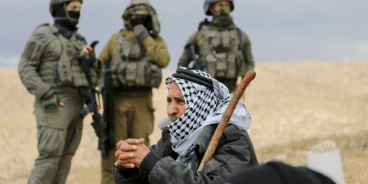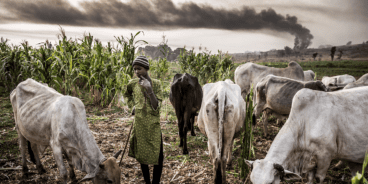
Joint Letter on the UN Regional Strategy to Address the Threat and Impact of the Activities of the Lord’s Resistance Army
Your Excellencies:
On June 27, 2012 the United Nations (UN) Security Council approved the UN Regional Strategy to Address the Threat and Impact of the Activities of the Lord’s Resistance Army (LRA). This strategy provides an important framework to coordinate and improve international responses to LRA violence, and builds on existing efforts led by LRA-affected governments, the African Union (AU), and donors to protect civilians and mitigate the impact of LRA attacks on civilian populations. Your collective efforts to develop this strategy and bring international attention to this important issue have created an unprecedented opportunity to resolve the LRA crisis, which has plagued communities in East and Central Africa for over 25 years.
As civil society organizations deeply concerned about the continued impact of LRA violence on human security and stability in the affected region, we urge you to ensure that this new strategy is implemented swiftly and effectively. In particular, we urge you to address two of the most pressing challenges to the effective implementation of the strategy: the failure of LRA-affected governments to adequately prioritize the protection of civilians vulnerable to LRA attacks and their failure to collaborate on cross-border solutions to the crisis. Without a united response to the conflict from these governments the significant investment of diplomatic and financial resources in the UN strategy will likely fail to achieve its objectives.
The continued impact of the LRA
As the Security Council recognized in its recent Presidential Statement, the humanitarian and security situation in LRA-affected areas remains grave. LRA forces have caused a protracted humanitarian crisis in the border region between Central African Republic (CAR), Democratic Republic of Congo (DRC), and South Sudan, displacing more than 440,000 people. In recent months, the situation has deteriorated further. The LRA committed at least 53 attacks against civilians in the first three months of 2012, a majority in northeastern DRC, a significant increase over the latter half of 2011. LRA forces killed and abducted more people in southeast CAR in the first six months of 2012 than they did in all of 2011, and are strongly suspected to be responsible for a series of brutal attacks on civilians in the Bakouma area of CAR in March and June 2012 in which 14 people were killed and 15 abducted.
Continued LRA activity also poses a major concern for regional stability. In CAR and DRC, insecurity caused by LRA attacks has prevented national governments from establishing institutions critical to consolidating control over lawless border regions, encouraging copycat attacks by bandits and rogue military personnel. Recent reported LRA movements in Sudan’s Darfur region have escalated tensions between the governments of South Sudan and Sudan. Though unconfirmed, LRA activity in South Darfur could spark further armed conflict between the two countries, particularly given the presence of other armed groups in the contested Kafia Kingi enclave along the border between South Darfur and Western Bahr el-Ghazal.
Regional governments failure to prioritize or collaborate on the LRA crisis
Despite the profound impact that LRA violence has had on communities in CAR, DRC, South Sudan, and Uganda, these governments have consistently failed to acknowledge the severity of the LRA crisis or taken adequate steps to fulfill their responsibility to protect civilians from LRA attacks. In DRC, senior government officials have repeatedly downplayed and even denied the threat LRA attacks pose to Congolese communities. Inadequate investigations into reports of LRA attacks and cross-border movements provide national governments with an excuse to downplay or ignore the LRA threat.
Military forces deployed to LRA-affected areas are often poorly trained and unpaid, and in some cases prey upon the very communities they are tasked with protecting. This is especially concerning given plans for some of these forces to be incorporated into the African Union’s LRA Regional Task Force (RTF). In CAR, the withdrawal of many of the Ugandan forces initially dedicated to counter-LRA operations in collaboration with their Central African counterparts has reduced their ability to protect civilians from LRA attacks launched in retaliation for military offensives. Further Ugandan troops are likely to be withdrawn in the coming months. In DRC, the recent transfer of the U.S.-trained 391st battalion from LRA-affected areas to Goma in order to fight the M23 rebellion has left a safe haven for the LRA in Congo, devoid of national armies to protect civilians.
Collaboration between LRA-affected governments on cross-border solutions to the crisis also remains poor. South Sudan, Sudan, and Uganda have failed to come to an agreement about how to address allegations of LRA activity in South Darfur. Tensions have also been heightened between Uganda and Congo, particularly since September 2011, when the Congolese government forced Ugandan troops pursuing LRA forces to leave its territory.
Fostering greater prioritization and cross-border collaboration on the LRA threat
Both the AU Peace and Security Council and the UN Security Council have recognized that greater collaboration between LRA-affected governments is needed to resolve the LRA crisis. We appreciate your efforts so far this year to achieve progress on this goal, including in particular Special Representative Moussa and Special Envoy Madeira’s visits to affected countries. The Joint Intelligence Operations Center (JIOC) in DRC and elements of the AU’s Regional Cooperation Initiative for the Elimination of the LRA (RCI-LRA), such as the Joint Coordination Mechanism and RTF command structure, can also improve regional collaboration.
We urge you to build on this work in the coming months to ensure that governments in the LRA-affected region place a higher priority on protecting civilians from LRA attacks and pursue cross-border solutions to the crisis.
In particular, we recommend the following steps:
Ensure thorough investigation of LRA activity as a critical first step in achieving a united regional response to the conflict. Such investigations should seek to establish where LRA commanders, including Joseph Kony, are operating and whether the LRA is responsible for specific attacks on civilians. To do so, we urge you to:
-
-
- Task a team from the AU’s Joint Operations Centre (JOC) in Yambio, South Sudan with traveling across the region to investigate reports of major attacks in which LRA forces are suspected;
- Request that the Government of Sudan allow a team from the AU JOC or the UN/AU mission to Darfur (UNAMID) to access areas of South Darfur and the Kafia Kingi enclave to investigate reports of LRA activity there;
- Provide increased resources to the JIOC and UN mission in DRC (MONUSCO) personnel to travel to field locations and investigate reports of LRA activity in northern DRC;
- Urge donors to fund the expansion of telecommunications and road infrastructure in LRA-affected areas to facilitate the flow of information about LRA activity.
-
Convene a side meeting at the UN General Assembly focused on the LRA to build trust between regional leaders at the highest levels and seek to de-escalate tension between LRA-affected governments. Such a meeting should bring together the heads of state of all LRA-affected governments, as well as senior representatives from the UN, AU, and current and potential donors, and seek to:
-
-
- Achieve a common understanding among LRA-affected governments and international partners of the scope of LRA activity and importance of resolving the crisis;
- Achieve a common diplomatic response to allegations of LRA presence in Sudan’s Darfur region;
- Address areas of disagreement and political tensions among regional governments, especially Uganda and DRC; and
- Attain concrete commitments from AU member states and international donors to provide resources needed to address persistent gaps in regional response efforts and implement the joint UN/AU LRA strategy.
-
Ensure LRA-affected governments do more to protect civilians from LRA attacks and other sources of insecurity. To do so, we urge you to:
-
-
- Encourage relevant senior UN officials to visit LRA-affected communities with senior government officials to help ensure national government officials publicly acknowledge the threat LRA violence poses to communities;
- Ensure national military forces comprising the AU-RTF are vetted for human rights abuses and are properly paid, fed, and equipped;
- Develop human rights and protection of civilians guidelines for RTF forces, and ensure participating troops are trained to adhere to these guidelines; and
- Encourage national governments to establish effective police and judicial institutions in LRA-affected areas.
-
Conclusion
Your efforts in the coming months to forge greater cooperation among LRA-affected governments on crossborder solutions to the crisis are critical to demonstrating that the new regional LRA strategy will be implemented swiftly and effectively. We thank you for efforts to date, and look forward to continued collaboration with your offices in the future.
Sincerely,
- The Enough Project
- Global Center for the Responsibility to Protect
- Invisible Children
- Resolve
For correspondence with the signatories of this letter please contact andrew.hudson@crisisaction.org; +1 (646)-233-1651.
Related Content


Atrocity Alert No. 445: Sudan, Syria and Eritrea
